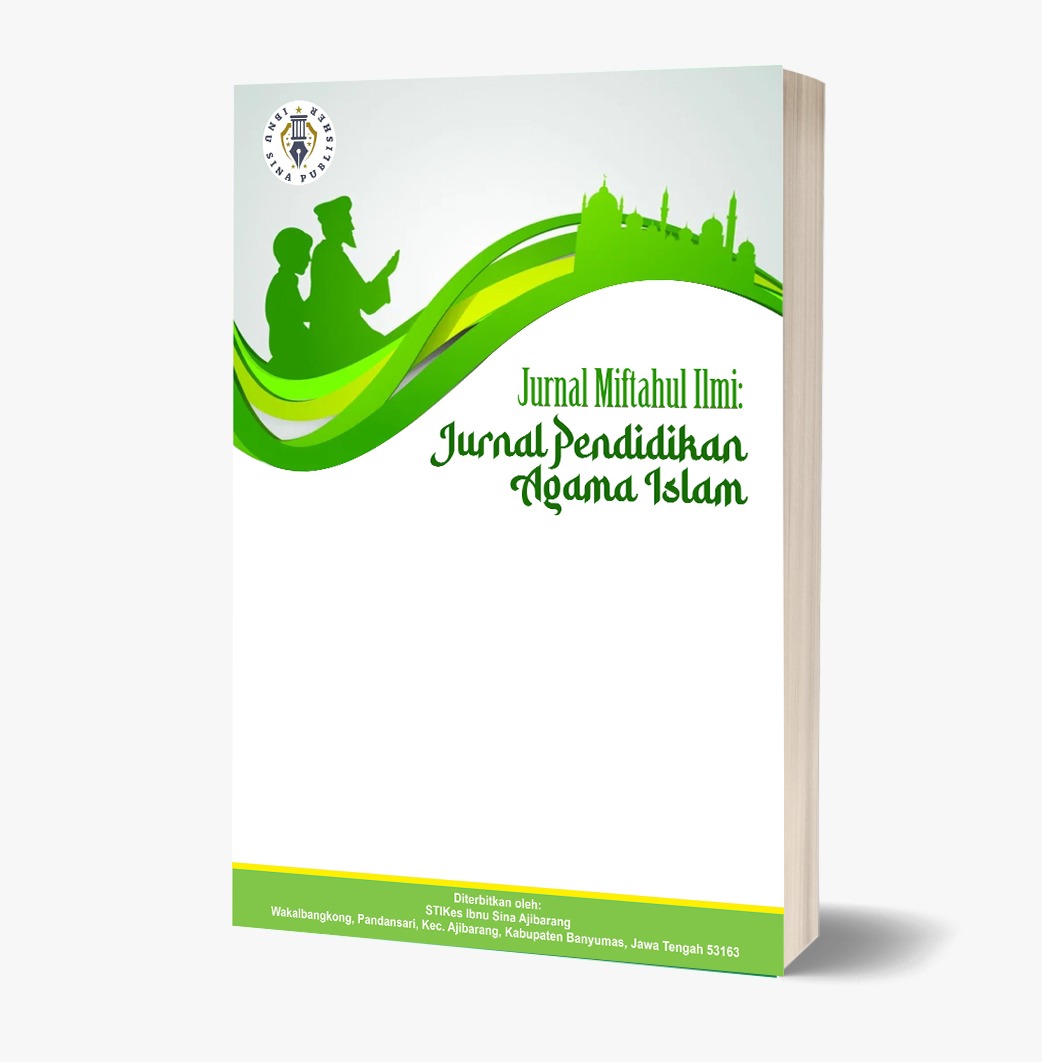Penguatan Moderasi Beragama dalam Kurikulum PAI : Studi Literatur terhadap Tantangan dan Peluang di Era Digital
DOI:
https://doi.org/10.59841/miftahulilmi.v2i1.40Keywords:
Digital Era, Digital Literacy, Islamic Education Curriculum, Religious ModerationAbstract
Religious moderation is an important concept in Islamic Religious Education (PAI), especially in the digital era that brings challenges such as the spread of extreme ideologies through the internet and the low digital literacy of students. This study aims to analyze the challenges and opportunities of strengthening religious moderation through the PAI curriculum and offer technology-based strategies. The research method uses a qualitative approach with a literature review. Data were obtained from various literatures, such as scientific journals, books, and policy documents, which were analyzed using the content analysis method. The results showed that the main challenges include lack of digital literacy, resistance to change, and limited supporting resources. On the other hand, opportunities include the utilization of digital technologies such as online learning platforms, social media, and technology-based educational content to convey moderation values in an attractive manner. Recommended strategies include the integration of moderation values in the curriculum, strengthening teacher competencies through digital training, and collaboration with various stakeholders. This research makes a novel contribution by integrating the challenges and opportunities of the digital era into the approach of strengthening religious moderation. The findings are expected to serve as a foundation for policymakers in creating a more adaptive and relevant PAI curriculum in the digital era.
References
Afiyanti, Y. (2014). Penggunaan literatur dalam penelitian kualitatif. Jurnal Keperawatan Indonesia, 9(1), 2003–2006. https://doi.org/10.7454/jki.v9i1.157
Aisyah, S., & Setyono, H. (2023). Strengthening the value of religious moderation through PAI-BP learning. Ta’dib: Jurnal Pendidikan Islam, 12(1), 9–16. https://doi.org/10.29313/tjpi.v12i1.11667
Al-Hasyimi, M. L., & Nisa, K. (2024). Moderasi beragama di Indonesia dalam perspektif fiqih pemikiran Yusuf Al Qardhawi. Jurnal Keislaman, 7(1), 211–229. https://doi.org/10.54298/jk.v7i1.256
Asari, H., Ritonga, M., Nursalimah, N., Megawati, B., Ruwaidah, R., & Watrianthos, R. (2024). Mapping the modernization of Islamic education: A bibliometrics analysis of research trends from 1965 to 2022. International Journal of Changes in Education, 00(April), 1–8. https://doi.org/10.47852/bonviewijce42023100
Casram, C. (2012). Membangun sikap toleransi beragama dalam masyarakat plural. Wawasan: Jurnal Ilmiah Agama dan Sosial Budaya, 1(2), 187–198.
Faisal, M. (2023). Implementasi nilai-nilai moderasi beragama dalam Al-Qur’an dan pengukuhan desa sadar kerukunan di Kota Banda Aceh. CENDEKIA: Jurnal Studi Keislaman, 9(2), 139–158. https://doi.org/10.37348/cendekia.v9i2.290
Falah, M. Z. N., Setiawan, A. B., & Habe, M. ’Izzuddin R. (2024). Implementation of religious moderation in the Qur’an: A solution to radicalism. Tanzil: Jurnal Studi Al-Qur’an, 7(1), 121–136.
Ferreira de Castro, M. F. (2024). Desinformação e fake news na educação. P2P e Inovação, 10(2), 1–17. https://doi.org/10.21728/p2p.2024v10n2e-6756
Gunada, I. W. A., Widiana, I. W., Jampel, I. N., & Ratnaya, I. G. (2024). Religious moderation studies: Evaluation of responsiveness to its implementation in the educational process. Padma Sari: Jurnal Ilmu Pendidikan, 04(01), 1–11. https://doi.org/10.53977/ps.v2i01.1094
Gutema, D. M., Pant, S., & Nikou, S. (2024). Exploring key themes and trends in international student mobility research: A systematic literature review. Journal of Applied Research in Higher Education, 16(3), 843–861. https://doi.org/10.1108/JARHE-05-2023-0195
Herdiana, D., Septiano Baroga, A., & Putra Fauzan, A. (2023). Promoting “moderasi beragama” as a unifying community value for the youth. Salus Publica: Journal of Community Service, 1(2), 28–34. https://doi.org/10.58905/saluspublica.v1i2.94
Kadli, J. H., & Kumbar, B. D. (2013). Library resources, services and information seeking behaviour in changing ICT environment: A literature review. Library Philosophy and Practice, 2013, 5–25.
Khotijah, K., Suhairi, S., & Bin Has, Q. A. (2024). Religious moderation perspectives on Arabic language learning for Islamic boarding schools in Lampung. Ijaz Arabi Journal of Arabic Learning, 7(1), 196–206. https://doi.org/10.18860/ijazarabi.v7i1.17811
Mukhlisin, M. (2024). Fostering tolerance through religious moderation: Strategies in Islamic education. Ihtirom: Jurnal Manajemen Pendidikan Islam, 3(2), 259–277.
Musyahid, M., & Kolis, N. (2023). Religious moderation implementation in Islamic education: A systematic review. MUDARRISUNA: Media Kajian Pendidikan Agama Islam, 13(4), 540–558.
Nafisa, A., Iskandar, A., & Nugraha, B. (2024). Religious moderation. Bulletin of Islamic Research, 1(4), 127–142. https://doi.org/10.69526/bir.v1i4.44
Panji, N., Astra, B., Hendrawati, T., & Andriyana, D. (2024). Leadership in Islamic education: Integrating ethical values in the digital age. IJSH, 01(2), 136–143.
Papavasileiou, E. F., & Dimou, I. (2024). Evidence of construct validity for work values using triangulation analysis. EuroMed Journal of Business. https://doi.org/10.1108/EMJB-10-2023-0287
Ramadhan, M. R., Basid, A., & Faizin, N. (2023). Implementing religious moderation in digital space: Challenges and opportunities for Generation Z. Aqlamuna: Journal of Educational Studies, 1(1), 116–135. https://doi.org/10.58223/aqlamuna.v1i1.234
Subairi, A. (2024). The role of religious education in dealing with the issue of radicalization among students. Al Ilmu: Journal Islamic Education, 1(October), 1–11.

















